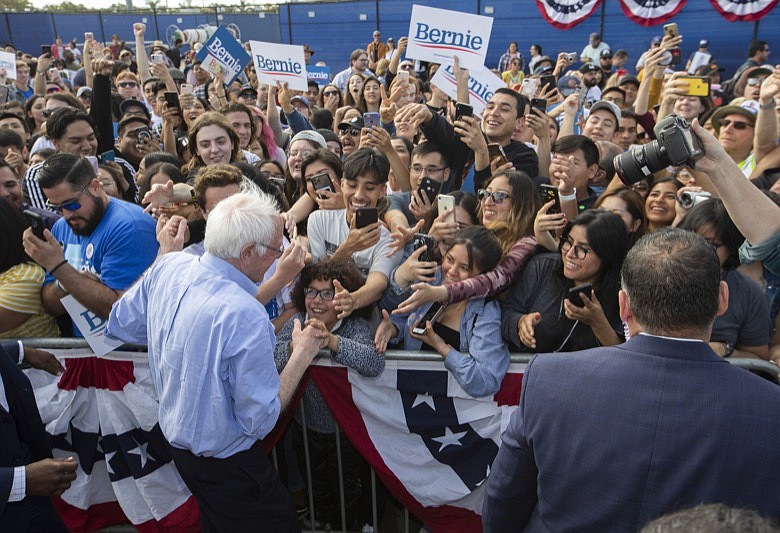Bernie Sanders has said that he will support the Democratic Party's presidential nominee, no matter who he or she is. But some Democrats worry that a lot of his supporters will not work or even vote for any other candidate, whereas the backers of his Democratic rivals will enthusiastically work or vote for anyone the party nominates, including Sanders.
It is too soon to know whether this worry is justified. But we do know that in 2016, many of Sanders's supporters were extremely angry that Hillary Clinton won the Democratic nomination, and they refused to support her.
According to one estimate, over 20% of Sanders voters declined to vote for Clinton - and they may well have thrown the election to Donald Trump. The estimate found that as many as 12% of Sanders supporters actually voted for Trump, and an additional 10% or so stayed home or supported a third-party candidate. At least some of them shared Trump's views on immigration. Others seemed to adopt a slogan: Bernie or bust.
If past is prologue, then many Sanders supporters would feel and act the same way in 2020, if he does not get the nomination. What's the explanation?
Much of the answer lies in one word: outrage.
Trump supporters and Sanders supporters have that, at least, in common. Their outrage is fueled by the dynamics of "group polarization," which means that when like-minded people speak mostly with one another, they usually end up more confident and more unified - and more extreme.
That is one reason that political rallies work (and can be both inspiring and frightening). If people think their candidate is the best, or other candidates are weak or sellouts, their judgments to that effect will be fueled and magnified by the very fact that they are surrounded by people who think the same thing. And if people begin with a degree of outrage, their interactions with one another will greatly intensify their feelings.
Whatever you think of Sanders, there is no doubt that outrage is sparking his campaign. Many of his supporters are disgusted with the political order; they think it is fundamentally broken.
They are anything but nostalgic for Barack Obama, whom they regard as a moderate, an unacceptable "neoliberal," or a kind of trimmer. They see other candidates for the Democratic nomination not merely as inferior to Sanders, but on another side of the fundamental political divide.
While most of these voters would back any Democratic nominee over Trump in any case, a lot of them might not. People who feel high levels of outrage, or are drawn to "democratic socialism," are especially likely to cast a protest vote, or stay at home, rather than engage in some calculation and conclude that by their own lights, any Democratic nominee is highly preferable to Trump.
If this problem arises, how can other aspiring nominees, and other Democrats in general, deal with it?
Because of bad blood between Sanders and Hillary Clinton, and between their respective supporters, it was especially challenging for her to take some of the necessary steps - in a nutshell, honoring and celebrating Sanders and his supporters, and suggesting that in terms of the most general goals and aspirations, the two campaigns were on the same side.
It's hard to argue with outrage, in politics as in ordinary life. It's much more effective to welcome it, or at least to say, as sincerely as you can, that it is justified and that you feel it, too.
As of now, of course, Sanders has a solid chance of winning the Democratic nomination. If he does, the supporters of the other candidates will have no choice but to embrace that outrage, even if they fundamentally disagree with Sanders on some crucial questions.
Bloomberg News
